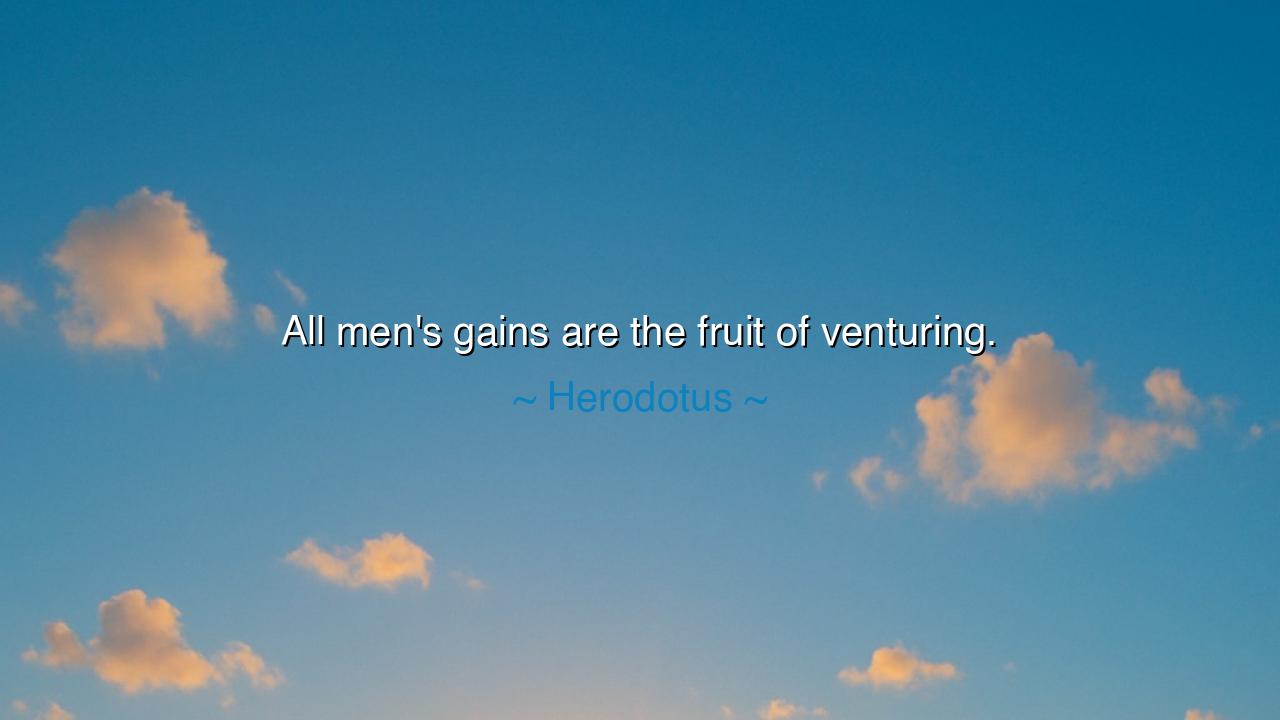
All men's gains are the fruit of venturing.






The words of Herodotus, the Father of History, ring through the corridors of time: “All men’s gains are the fruit of venturing.” In this simple yet mighty truth, he captures the essence of human striving. For nothing of value is ever won by those who cling to safety, who dwell only in the shadows of certainty. To gain is to risk; to advance is to step into the unknown; to hold treasure in one’s hands is first to hazard its loss. Thus, all gains, whether of wealth, wisdom, or glory, are born of venturing—the courageous act of leaving behind the comfort of what is and reaching toward what could be.
The origin of this saying lies in Herodotus’s deep reflection upon the deeds of nations and kings. He saw empires rise not through timidity but through boldness. He witnessed men who left their homes to cross seas, to fight battles, to strike bargains in distant lands. He knew well that the victories of Persia, Greece, and Egypt were not granted by fortune alone, but by daring action. The world does not reward hesitation; it rewards the one who ventures forth, who risks defeat in order to grasp triumph.
Consider the tale of Christopher Columbus, who sailed westward into seas where others feared the edge of the world. His journey was fraught with peril—mutiny among his crew, storms upon the ocean, uncertainty that pressed like a weight upon every soul aboard. Yet he ventured. And though he sought one land and found another, his gain reshaped history itself, opening a new world to exploration, trade, and conquest. Whatever judgment history lays upon his deeds, none can deny that they were the fruit of venturing.
The ancients themselves lived this truth in every breath. The Spartans at Thermopylae ventured into battle though outnumbered beyond reason, and in their sacrifice they gained eternal honor. The Athenians ventured upon the sea at Salamis, and in their daring, they preserved the freedom of Greece against the Persian tide. Even the philosophers ventured—Socrates, daring to question the certainties of men, gained wisdom that has outlived the stones of Athens. Herodotus saw it all and knew: there is no greatness without the gamble of the soul.
But one must not confuse venturing with recklessness. The wisdom here is not to leap blindly into ruin, but to accept that all forward movement carries risk. The farmer ventures when he sows seed into the ground, never certain what storms or droughts may come. The lover ventures when he bares his heart, uncertain whether love will be returned or spurned. The merchant ventures when he sends his ships across the seas, not knowing whether they shall return with profit or sink into the depths. In every field of life, gain requires courage, and courage requires the will to venture.
The lesson is clear: do not cling so tightly to safety that you strangle your own future. Fortune favors not only the bold but the steadfast—the one who ventures wisely, who weighs the risks yet does not let fear bind his feet. All men’s gains are the fruit of venturing; therefore, if you would grow, you must dare. Step beyond the walls of comfort. Face the unknown with a steady heart. Accept that failure may come, but remember also that no failure is final for the one who learns and ventures again.
In practice, begin by taking small steps of courage. Speak when silence is easier. Try when failure seems likely. Begin a task though its end is uncertain. Each act of venturing builds strength, and each strength leads to greater gains. And when larger choices stand before you—whether to change, to risk, to leap—remember Herodotus’s truth: that only those who venture gain, while those who cling to certainty remain empty-handed.
Thus, hold fast to this wisdom: “All men’s gains are the fruit of venturing.” May it remind you that progress belongs not to the fearful, but to the daring. Venture forth, therefore, with courage, with wisdom, with purpose—and you shall reap the fruit that only the brave can claim.






AAdministratorAdministrator
Welcome, honored guests. Please leave a comment, we will respond soon